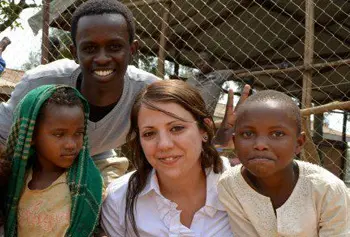Skills, Internships Lead to Meaningful Work

01/18/2013
By Sandra Seitz
The first graduates of UMass Lowell’s Peace and Conflict Studies master’s degree program are entering their careers ready for all challenges. Cross-disciplinary scholarship and demanding, relevant internships have prepared these new alums to step into responsible positions.
John Espinosa, who came to the program with a law degree from the University of Michigan and a year of legal practice, especially valued the hands-on learning.
“The biggest benefit for me has been the internship – I’m grateful for a program that offers learning by doing,” he says. Espinosa interned at the Law Center at Middlesex Community College (MCC) that offers a variety of community and court mediation programs.
“I got the opportunity to work with their peer mediation program at Lowell High School. It was a fantastic experience,” says Espinosa. “I chose UMass Lowell’s program because I wanted to use my legal background in a nontraditional way, through mediation and education.”
Espinosa has accepted a full-time position as assistant professor and coordinator of the Paralegal Program at MCC – a first step on his career plan “to encourage empowerment and independence through education.”
The Peace and Conflict Studies program responds to the increasing need for people with cross-cultural awareness, skill in conflict resolution and international experience. Career options are broad, ranging from work within human rights and violence reduction organizations to the justice system and international corporations. UMass Lowell’s is the only master’s degree program in New England public higher education. Students from adjoining states can take advantage of reduced tuition.
Prof. Paula Rayman, program director, says, “Our goal is to establish the conditions for sustainable societies, by investigating the roots of conflict, how issues may be resolved and how to build peace.
“The program attracts wonderful individuals, many from other countries, who want to make a difference in society,” she says. “Such students bring a wealth of experience to the classroom.” As examples, one student had been active in the movement to end the civil war in Liberia, another observed elections in Afghanistan for the United Nations and a third gathered information on the Cambodian genocide for that nation’s Documentation Center.
Student Jennifer Castano also has found rewarding work through an internship.
“I had the opportunity to intern for Congresswoman Niki Tsongas and received a job offer to continue working for her as an immigration case worker as I finish my master’s,” says Castano. “Working at the Congressional office, I continue to learn every day as our immigration system changes. Niki’s team is full of motivated and hardworking individuals and I’m proud to be part of it.”
Castano began Peace and Conflict Studies as part of the BA-MA program, taking graduate courses while completing her degree in criminal justice with a concentration in homeland security. She will work in the Lawrence office, putting her Spanish skills and Latino cultural background to good use in helping constituents in immigration cases.
Peace and Conflict students arrive with purpose and start projects early. Vanessa Colomba, with a bachelor’s in psychology and a minor in history (UMass Lowell 2010), was interested in genocide studies.
Colomba chose the interdisciplinary program for its “emphasis on understanding your role as a global citizen,” she says. “Learning about nonviolent actions and movements is empowering – how ordinary people can change the situation through awareness and speaking up.” In August, she joined a human rights delegation to Rwanda, working with an organization for university students who are genocide survivors.
“The Rwandan organization provides a family environment, because a significant number of survivors are orphans,” says Colomba, who has been asked to develop a mentoring program to add to the existing services. “I began to understand how my skills can apply.”
Colomba looks forward to writing a thesis – to develop a firm foundation of knowledge about the causes of genocide and the issues post-genocide rebuilding.
